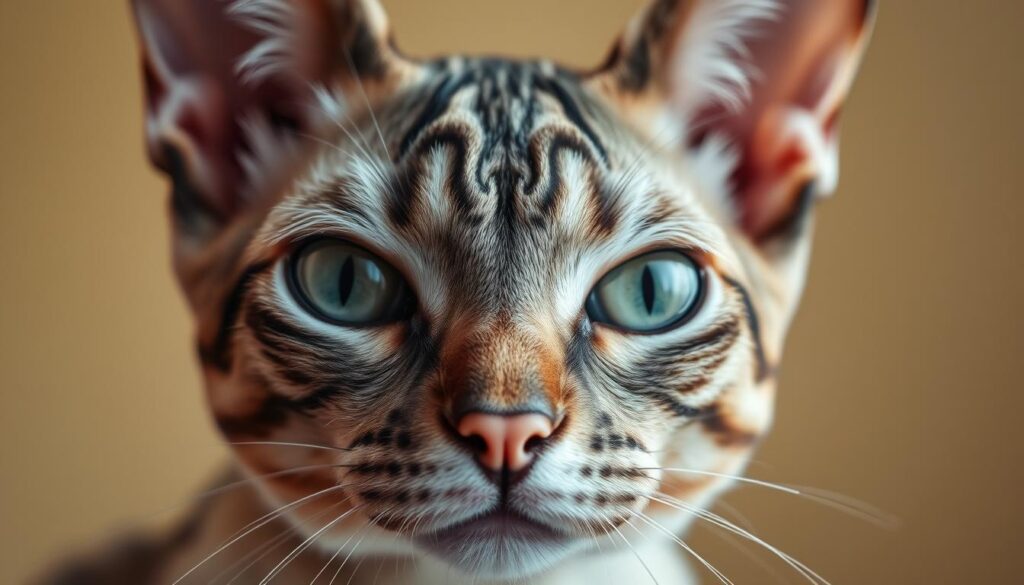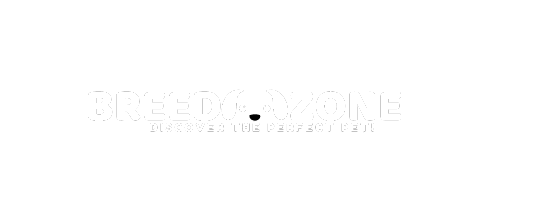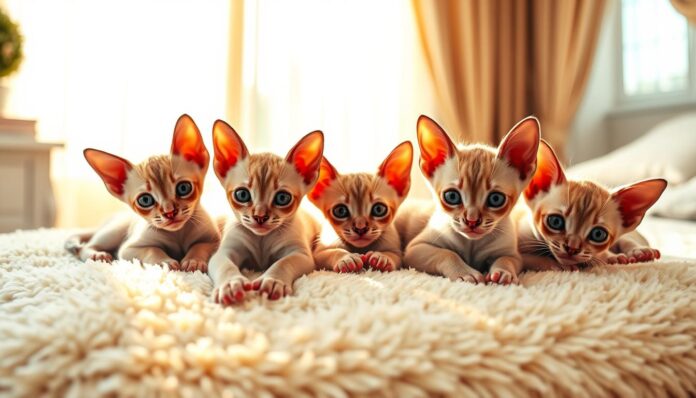More than 40% of U.S. homes now want hypoallergenic pets. The Devon rex cat is now one of the top five breeds in 2024. These cats are small, weighing 6 to 9 pounds, and live for 10 to 15 years.
Their curly coats are due to a special genetic mutation. This makes them 70% less allergenic than regular cats. They have fewer Fel d 1 proteins.
Devon rex kittens are loved worldwide by groups like the Cat Fanciers’ Association (CFA) and The International Cat Association (TICA). They have triangular heads, big ears, and coats that can be silky or curly. Their playful and social nature makes them great for families.
They also need very little grooming. As more people look for allergy-friendly pets, the Devon rex is becoming a popular choice. Its charm and adaptability make it a modern favorite.
Enchanting Devon Rex Breed
The Devon Rex cat emerged in 1950s England, blending elegance with charm. Their story starts with Kirlee, a feral tomcat with a curly coat. This led to the breed’s discovery in Devon, England. We’ll look at their origin, growing popularity, and what makes them special.
Origin and History of Devon Rex Cats
In 1959, a litter in Devon, England, had Kirlee, a cat with a curly coat. Unlike the Cornish Rex, Kirlee’s mutation was unique. Breeders confirmed this when Kirlee’s kittens with Cornish Rex queens were not curly. By the 1960s, the Devon Rex was recognized as its own breed, known for its whimsical look and lively spirit.
Why Devon Rex Kittens Are Trending in Popularity
Devon Rex kittens are loved for their hypoallergenic coats and playful nature. Social media and celebrity pets have made them even more popular. Their low-shedding coats are a big plus for families with allergies.
Distinctive Features at a Glance
| Category | Devon Rex Characteristics |
|---|---|
| Coat | Wavy, short coat with minimal guard hairs, reducing shedding |
| Appearance | Large, low-set ears; almond-shaped eyes; slender, muscular body |
| Personality | Highly social, mischievous, and affectionate, thriving in interactive environments |
| Lifespan | Typically 10–15 years, with some reaching 18 years |
These devon rex characteristics make them unique and beloved. They mix whimsy with practicality, appealing to today’s pet lovers.
Physical Characteristics of Devon Rex Kittens
Devon Rex kittens are known for their devon rex characteristics. They are elegant and playful. Their bodies are small and slender, weighing 6–9 pounds when they grow up. Despite their size, they are very energetic and agile.
Their ears are big and look like bats, and their eyes are large and expressive. These features give them an elfin look. This makes them stand out among other cat breeds.

- Ears: Oversized ears with a delicate structure, contributing to their whimsical look.
- Eyes: Round eyes in colors like green, gold, or copper, often contrasting with coat shades.
- Coat: A short, curly coat with a soft texture, hypoallergenic and low-shedding compared to most breeds.
| Life Stage | Age | Weight | Milestones |
|---|---|---|---|
| Newborn | 0–4 weeks | 3–10 oz | Eyes open at 10–12 days |
| Kitten | 8–12 weeks | 2–4 lbs | Vaccinations completed; playful and active |
| Adolescent | 6 months | 4–6 lbs | Full teeth set; peak energy levels |
| Adult | 12+ months | 6–9 lbs | Full size reached; coat matures into signature waves |
Devon rex kittens grow fast, reaching full devon rex characteristics by 12 months. They have a fine bone structure but are very energetic. This makes them perfect for homes that are active.
It’s important to take them to the vet regularly. This helps them stay healthy, watching out for any genetic health issues. With their unique look and a lifespan of 9–15 years, they offer many years of companionship.
The Unique Coat of Devon Rex Cats
The Devon Rex cat’s coat is truly special. It’s both beautiful and easy to care for. Their fur is a key part of their genetics, making them stand out.
Wavy Coat Texture and Maintenance
Devon Rex cats have a soft, wavy coat. It’s unlike any other cat fur. Their short, curly fur comes from a special gene, making it feel like velvet.
Weekly grooming keeps their coat healthy. Use a soft cloth or rubber brush. But don’t bathe them too often to keep their skin healthy.
Color Variations and Patterns
Devon Rex cats come in many colors and patterns. Each one is as unique as the cat itself. Here are some common colors:
| Color Category | Examples |
|---|---|
| Solid | Black, blue, chocolate, or cinnamon |
| Tabby | Ticked, mackerel, classic, and spotted patterns |
| Bicolor | White with patches of solid or tabby patterns |
| Tortoiseshell | Black and red swirls, often seen in females |
| Pointed | Cool body tones with darker extremities |
Every Devon Rex cat’s coat pattern is unique. No two are alike.
Hypoallergenic Properties: Fact vs. Fiction
The Devon Rex cat is often called hypoallergenic. But this needs some explanation. Their coat sheds less, which means less dander. They also make less Fel d 1 protein, a main allergen in cat saliva.
But, no cat is completely allergen-free. People with allergies should meet a Devon Rex before adopting. This helps them see if they can tolerate the cat.
Devon Rex Temperament and Personality Traits
The Devon Rex temperament is full of life and love. They love being around people so much, they’re called “velcro cats.” Their fun and social nature makes them perfect for families looking for a playful pet.

Playful and Mischievous Nature
Devon Rex kittens keep their playful energy as adults. They love to chase shadows, play with curtains, or help with chores. They need something to do, so they might sit on bookshelves or open drawers. Every room becomes a playground for them.
Intelligence and Trainability
Devon Rex cats are very smart and can learn tricks. They love treats and respond well to commands. They’re good at solving problems, like opening doors or figuring out puzzle feeders. With consistent training, they can do amazing things.
Social Behavior with Humans and Other Pets
These cats bond strongly with their families, always by their side. They get along well with dogs and other cats, avoiding fights. They don’t like to be alone for too long, as it can make them bored. They’re great in homes with other pets, mixing curiosity with kindness.
Essential Care Guide for Devon Rex Kittens
Devon rex kittens need special care because of their unique traits. They love to play and have a sensitive coat. Make sure they get daily playtime to keep them happy and healthy.
- Exercise: Use feather toys or puzzle feeders for 15-20 minutes daily to channel their mischievous energy.
- Diet: Feed high-protein kitten food in measured portions to prevent weight gain. Consult vets for portion guidelines.
- Grooming: Brush weekly with a soft glove to remove loose fur without damaging their fine coat. Bathe monthly with cat-specific shampoo for oily skin management.
- Ear hygiene: Clean ears weekly using vet-approved solutions to prevent wax buildup.
| Aspect | Details |
|---|---|
| Weight Range | 5–10 lbs (2.3–4.5 kg) |
| Lifespan | 10–15 years with proper care |
| Shedding | Minimal due to short curly coat |
| Grooming Frequency | Weekly brushing, monthly baths |

Keeping an eye on their health is very important. Take them to the vet once a year for check-ups. Make sure they get all their vaccinations and follow breeding programs that help avoid genetic problems. Their thin coats mean they need a warm place to live, so keep them indoors, even when they’re young.
Ragdoll Kittens: Affectionate and Playful Feline Companions
Nutrition and Dietary Requirements
Proper nutrition is key for a Devon rex cat’s energy and health. A good diet supports their playful nature and unique coat. Start with high-quality protein to meet their growth needs.
Recommended Feeding Schedule
Devon rex kittens need to eat often when they’re growing. Here’s a schedule for their health:
- 0-6 months: Feed 3–4 small meals daily, totaling 200–250 calories.
- 6 months–adult: Switch to 2 measured meals daily, adjusting portions based on activity level.
- Adult maintenance: Aim for 22% protein, 8% fat, and 1% fiber in their food.
Special Dietary Considerations
Devon rex care needs focus on their metabolic needs. Important guidelines include:
- Protein focus: Animal-based proteins (70% of diet) support muscle growth and coat health.
- Nutrient balance: A 1.2:1 calcium-to-phosphorus ratio is needed for bone development.
- Allergen awareness: Watch for sensitivities to grains or fillers; get a vet’s advice for a personalized plan.
Preventing Common Nutritional Issues
More than 50% of cats face weight issues, so avoid overfeeding. Use these strategies to prevent problems:

- Use measured portions to curb obesity risks.
- Limit carbohydrates to 10% of their diet to avoid digestive disruptions.
- Include vitamin A and zinc supplements if advised by a vet.
Regular vet checkups and gradual diet changes help keep them healthy. Following these guidelines ensures a Devon rex cat thrives at all stages of life.
Health Considerations and Common Medical Issues
Devon Rex cats are known for their strong health, living up to 10 to 15 years with the right care. Their unique fine coat and playful nature need careful watching. This is to tackle breed-specific health issues.
- Hypertrophic Cardiomyopathy (HCM): A leading genetic heart condition requiring annual cardiac ultrasounds for early detection.
- Patellar Luxation: A hereditary knee instability that may necessitate surgical correction in severe cases.
- Vitamin K-Dependent Coagulopathy: A clotting disorder unique to the breed, requiring bloodwork monitoring.
- Skin Sensitivity: Their thin coat exposes skin to sunburn and infections, demanding protective grooming practices.
Preventative care for Devon Rex cats includes regular vet visits and diet management. Important steps include:
- Biannual vet exams with genetic testing for heart and clotting disorders.
- Sunscreen application on exposed skin areas.
- Low-impact exercise to maintain ideal weight and joint health.
Watch for signs like labored breathing, limping, or abnormal bleeding. Early treatment helps keep Devon Rex cats healthy and full of life. This way, they can keep their playful and mischievous nature for many years.
Finding Devon Rex Kittens for Sale
Looking for Devon Rex kittens for sale needs careful research. Good breeders focus on health and ethics. Prices are $1,500 to $3,000, showing the cost of health checks and socialization. It’s important to check breeder websites often because kittens are available seasonally.
Reputable Devon Rex Breeders in the United States
Make sure breeders are certified by TICA or CFA. Look for breeders with COI (Coefficient of Inbreeding) under 10%, like Alwynrose’s 2025 litters averaging 2.63%. Good breeders let you see their facilities and meet the parents. Their websites should have vaccination records and clear contract terms for kittens.
Questions to Ask Before Purchasing
- Are both parent cats present for inspection?
- What genetic tests (e.g., HCM screening) have been completed?
- What vaccinations and deworming have been administered?
- Does the contract include a health guarantee?
- How are kittens socialized with humans and other pets?
Red Flags to Watch For
Be cautious of kittens priced under $1,200. Other warning signs include:
- Unwillingness to show breeding facilities
- No documentation of health records
- Kittens sold before 12 weeks of age
- Multiple litters advertised at the same time
Always ask for health testing proof and avoid sellers who skip USDA licensing. Ethical breeders offer COI reports and feeding histories. This ensures kittens are healthy and well-socialized.
Devon Rex Adoption: Rescues and Alternatives
Thinking about devon rex adoption is a great way to bring this special breed into your life. Adult devon rex cat rescues make wonderful pets and help animals in need. Here’s how to begin your journey.

Benefits of Adopting Adult Devon Rex Cats
Adult Devon Rex cats are playful but also stable. They offer many benefits:
- Known traits: Their personality is already set, so you know what to expect.
- Health transparency: Rescues often share health histories and spay/neuter details.
- Cost savings: Adoption fees ($300–$600) are much lower than buying from a breeder ($1,800–$5,000).
- Longevity: With the right care, they can live 9–15 years, making them great long-term friends.
Where to Find Devon Rex Cats for Adoption
| Resource | Description | Website |
|---|---|---|
| Breed-Specific Rescues | Devon Rex Rescue networks focus on finding homes for purebreds in need. | Devon Rex Rescue |
| Online Platforms | PetFinder and Adopt-a-Pet list Devon Rex cats across the country. | PetFinder |
| Local Shelters | Regular visits to local shelters might uncover unexpected Devon Rex finds. | Search devon rex adoption near you. |
Preparation for Bringing Home a Rescue
Here’s how to make the transition smooth:
- Quarantine area: Create a quiet room with essentials like food, water, and a litter box.
- Health check: Get a vet visit within 48 hours to check their health.
- Introductions: Introduce the cat slowly to other pets and family members.
- Behavioral support: Be patient as they adjust to their new home, possibly overcoming past issues.
Adopting a Devon Rex cat can greatly enrich your life and theirs. Start looking today to find a loyal companion waiting for a forever home.
Understanding Devon Rex Prices and Ongoing Costs
Devon Rex cats from good breeders start at $1,500 and can go up to $2,500. These prices cover health checks, pedigree papers, and socializing. Rescue options cost $25 to $500, based on where you are.
Getting started includes buying litter boxes, food bowls, and toys for $200–$500. Here’s what you might spend each month:
| Expense Type | Cost Range |
|---|---|
| Food | $10–$80 |
| Veterinary care | $30–$180 |
| Grooming | $0–$50 |
| Insurance | $25–$100 |
| Total monthly average | $60–$240 |
Long-term costs include genetic tests and dental cleanings. Emergency vet visits can cost over $500. Spaying or neutering is $50–$150. Microchipping is $45–$55, and yearly vet visits are needed.
Over 15 years, these costs show the value of a long-term pet. Devon rex prices from honest breeders include health records and temperament checks. This makes their higher prices worth it.
Preparing Your Home for a Devon Rex Kitten
Devon Rex kittens need a safe and fun place to live. They are curious and love to climb, so you must plan carefully. Here are some steps to make a safe space for your new pet.
Essential Supplies Checklist
First, get these things to take care of your devon rex care needs:
- Essentials: A litter box, ceramic/metal bowls, warm bedding (because they have thin coats), scratching posts, and a strong carrier (hard-shell for trips).
- Recommended: Fun toys, cat trees for climbing, and a water fountain (they like running water).
- Optional: Pet cameras for watching or automated feeders for when you’re busy.

Kitten-Proofing Your Living Space
Here’s how to make your home safe:
- Keep electrical cords and window blind cords out of reach to stop strangulation.
- Take away small things (like rubber bands, hair ties) and dangerous plants (like lilies).
- Make sure bathroom and dryer doors are closed, and check appliances before you shut them (like fridges).
- Use child-proof locks on cabinets and keep drawers closed (they can open them!).
- Have a 14-day quarantine area when introducing them to other pets.
It’s normal for them to hide for a few days.
Creating an Enriching Environment
Make their life fun with:
- High places like tall cat trees (they love to climb).
- Changing toys to keep them interested (hide some and bring them out weekly).
- Warm bedding in sunny spots (they like to be warm).
Put these things together to support their active lifestyle.
Conclusion: Is a Devon Rex Kitten Right for You?
The Devon Rex’s playful devon rex temperament makes them lively and fun. They love to play and are very smart. This makes them great for families who enjoy spending time together.
They are good for people with allergies because they don’t shed much. But, they need to stay warm indoors and avoid too much sun.
It’s important to take them to the vet often to check for health problems. They have a high energy level and need lots of attention. They also get along well with other pets, but need to be introduced slowly.
When looking for a Devon Rex, find breeders who are certified by groups like the Cat Fanciers’ Association (CFA) or The International Cat Association (TICA). Good breeders focus on health and socialization. You can also adopt adult Devon Rex cats from shelters like the ASPCA.
Devon Rex cats live for 10–15 years, so you need to be ready for a long commitment. They are fun and playful, but they need a home that loves their unique personality.
FAQ
What are the distinctive characteristics of Devon Rex kittens?
Devon Rex kittens have big ears and a slender body. Their fur is soft and curly. They also have high cheekbones and thick whiskers, giving them a pixie-like look.
These kittens are very playful and make great companions.
How do I care for a Devon Rex cat?
Devon Rex cats need a warm place to live because of their thin fur. They also need regular grooming. Make sure they get enough play and interaction.
Are Devon Rex cats hypoallergenic?
Devon Rex cats are not completely hypoallergenic. But, they shed less than many breeds. This can help people with allergies feel better around them.
What should I feed my Devon Rex kitten?
Feed your Devon Rex kitten high-quality food. They have a fast metabolism. Choose the right mix of protein, fat, and carbs to keep them healthy and active.
What are the common health issues for Devon Rex cats?
Devon Rex cats can get Hypertrophic Cardiomyopathy (HCM), patellar luxation, and skin problems. Regular vet visits and care are key to their health.
How can I find reputable Devon Rex breeders?
Look for Devon Rex breeders certified by TICA or CFA. They should follow ethical breeding. Research their reputation and ask about health and socialization.
What are the benefits of adopting a Devon Rex cat instead of buying from a breeder?
Adopting a Devon Rex cat gives a loving home to a cat in need. Adult cats often have set personalities but remain playful. It’s cheaper and supports rescue groups.
How much do Devon Rex kittens cost?
Devon Rex kittens cost between
FAQ
What are the distinctive characteristics of Devon Rex kittens?
Devon Rex kittens have big ears and a slender body. Their fur is soft and curly. They also have high cheekbones and thick whiskers, giving them a pixie-like look.
These kittens are very playful and make great companions.
How do I care for a Devon Rex cat?
Devon Rex cats need a warm place to live because of their thin fur. They also need regular grooming. Make sure they get enough play and interaction.
Are Devon Rex cats hypoallergenic?
Devon Rex cats are not completely hypoallergenic. But, they shed less than many breeds. This can help people with allergies feel better around them.
What should I feed my Devon Rex kitten?
Feed your Devon Rex kitten high-quality food. They have a fast metabolism. Choose the right mix of protein, fat, and carbs to keep them healthy and active.
What are the common health issues for Devon Rex cats?
Devon Rex cats can get Hypertrophic Cardiomyopathy (HCM), patellar luxation, and skin problems. Regular vet visits and care are key to their health.
How can I find reputable Devon Rex breeders?
Look for Devon Rex breeders certified by TICA or CFA. They should follow ethical breeding. Research their reputation and ask about health and socialization.
What are the benefits of adopting a Devon Rex cat instead of buying from a breeder?
Adopting a Devon Rex cat gives a loving home to a cat in need. Adult cats often have set personalities but remain playful. It’s cheaper and supports rescue groups.
How much do Devon Rex kittens cost?
Devon Rex kittens cost between $1,500 to $2,500. Prices vary based on bloodlines and coat quality. Remember, there are ongoing costs for their care.
What supplies do I need before bringing home a Devon Rex kitten?
You’ll need good food, a litter box, dishes, and scratching posts. Also, get comfortable bedding. Create a fun environment with toys and climbing spots.
Are Devon Rex kittens suitable for families with children or other pets?
Yes, Devon Rex kittens are friendly and get along with kids and pets. They love to play and be part of the family.
,500 to ,500. Prices vary based on bloodlines and coat quality. Remember, there are ongoing costs for their care.
What supplies do I need before bringing home a Devon Rex kitten?
You’ll need good food, a litter box, dishes, and scratching posts. Also, get comfortable bedding. Create a fun environment with toys and climbing spots.
Are Devon Rex kittens suitable for families with children or other pets?
Yes, Devon Rex kittens are friendly and get along with kids and pets. They love to play and be part of the family.


